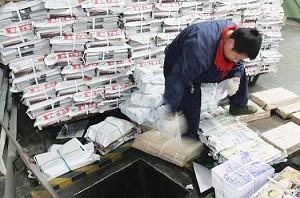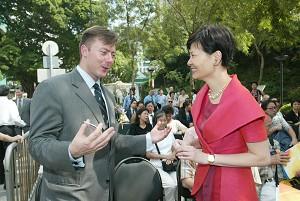A popular weekly magazine has become the latest battle ground for those in China trying to introduce a measure of freedom of the press into their society. Bingdian (Freezing Point) was suspended by the Chinese Communist regime on Jan. 24. While it is due to resume publication on March 1, both its Editor-in-Chief and Assistant Editor-in-Chief have been removed, and the magazine’s first issue will criticize a previously published article.
According to an open letter of Feb. 17 signed by Li Datong and Lu Yuegang, respectively Bingdian’s Editor-in-Chief and Assistant Editor-in-Chief until Jan. 24, the two were informed about the restarting of Bingdian on Feb. 16 by an announcement from the Party authorities in the China Youth Daily, the newspaper that publishes the magazine. The same announcement, wrote Li and Lu, states that they both have been stripped of all editorial responsibilities and transferred to the paper’s news research department.
The Feb. 16 announcement, according to Li and Lu, also requires that in the first issue with which Bingdian resumes publication the magazine should seriously criticize the article “Modernization and History Textbooks” by Yuan Weishi, a history professor of the Zhongshan University in Guangdong province.
In that article, published in Bingdian on Jan. 11, Yuan Weishi uses the metaphor “children fed on wolf’s milk” to describe students in China being taught distorted history by China’s history textbooks. Citing numerous examples from a widely used history textbook about twentieth-century Chinese history, Yuan arrives at the conclusion that the textbook is written on the basis of three premises: 1) the present Chinese culture is superior to all others; 2) foreign culture is invariably evil and has corrupted the pure nature of the present Chinese culture; 3) it is right or acceptable to use political power or totalitarian means to eradicate evil in the realm of ideology.
After the appearance of this article, Li and Lu received at least two memorandums from the Central Publicity Department criticizing Bingdian’s publication of Yuan’s article.
On Feb. 25, Li posted an open letter on the web protesting the suspension of Bingdian. He said the suspension not only lacked constitutional and legal basis, but also completely ignored all proper administrative procedures. At the same time he requested supporters to sign an online petition.
The news of Bingdian being suspended immediately caught the attention of major media around the world. Well-known writers both in and outside China published open letters supporting the magazine. In addition, on Feb. 13, thirteen senior party members and former high-ranking Chinese officials jumped to the magazine’s defense with an open letter; among them are the former Head of the Central Publicity Department Zhu Houze, former Secretary of Mao Zedong Li Rui, former Vice-President of the China News Agency Li Pu, and former Editor-in-Chief of People’s Daily Hu Jiwei.
Accumulated Tension
Founded in January 1995 and published every Wednesday, Bingdian was one of the most outspoken publications in China until Jan. 25. Over the years, its unreserved criticism on the Chinese Communist regime’s policies has angered some members of the CCP.
Most noticeably, in late 2003 the magazine published an article based on an interview with the famous human rights lawyer Gao Zhisheng. That article details the plight of property owners whose properties had been expropriated so that the state could lease then out to generate income. In 2004, Lu published in the magazine an open letter directly criticizing Zhao Yong, General Secretary of the Youth League, for his remark bidding good riddance to any newsman who did not want to take party orders.
In August last year, right after the China Youth Daily’s party authorities had announced “The Evaluation of the Performance of Editors and Reporters,” Li Datong wrote a long open letter questioning the criteria used in the evaluation, commenting that the evaluation was aimed at enslaving and downgrading editors and reporters.
Given how Li and Lu have offended some senior party members, many see the removing of them as a kind of revenge that also serves the purpose of “killing one man to terrorize a thousand.”
Yet the restarting of the magazine shortly after its suspension is extremely unusual in the eyes of some Bingdian staff members, who believe that there is disagreement at the central level of the Party about the initial decision.
In their open letter, Li and Lu said it was totally unreasonable to blame Li for publishing Yuan’s article in Bingdian on Jan. 11 because the final decision about the magazine’s contents rested with the Editor-in-Chief of the newspaper, not with Li. In an interview Li told Radio Free Asia that removing him from his previous position was “political persecution.”
This is the second time that Li Datong, a staff member of the China Youth Daily for 28 years, has been transferred to the paper’s news research department. He was transferred to the same department in 1989 after openly calling for press freedom during the students’ protest at Tiananmen and was made to stay there for 5 years.
Li said that even though Bingdian resumes publication on March 1, in reality “Bingdian is already dead.”


